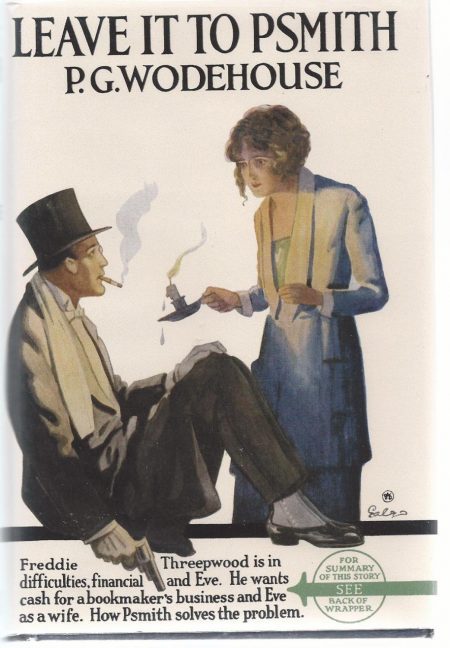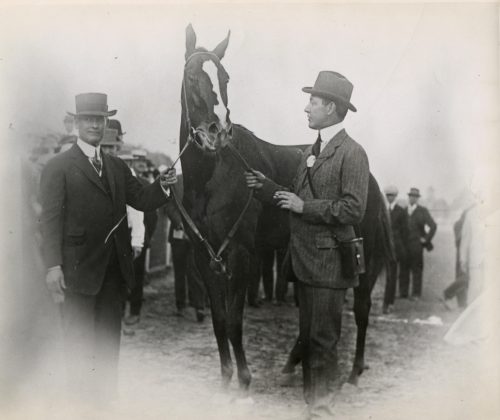LEAVE IT TO PSMITH (4)
By:
January 22, 2019

Leave It to Psmith (1923) is the last and most rewarding of four novels featuring the dandy, wit, and would-be adventurer Ronald Eustace Psmith, one of P.G. Wodehouse‘s most popular characters. (“One can date exactly,” Evelyn Waugh claimed, in reference to Psmith’s debut in the 1909 novel Mike, “the first moment when Wodehouse was touched by the sacred flame.”) Leave It to Psmith‘s copyright enters the public domain in 2019; HiLoBooks is pleased to serialize this terrific book here at HILOBROW. Enjoy!

3.
As Mr Keeble, red-eyed and overwrought, rose slowly from his chair and began to swell in ominous silence, his nephew raised his hand appealingly. It began to occur to the Hon. Freddie that he had perhaps not led up to his request with the maximum of smooth tact.
‘Half a jiffy!’ he entreated. ‘I say, don’t go in off the deep end for just a second. I can explain.’
Mr Keeble’s feelings expressed themselves in a loud snort. ‘Explain!’
‘Well, I can. Whole trouble was, I started at the wrong end. Shouldn’t have sprung it on you like that. The fact is, Uncle Joe, I’ve got a scheme. I give you my word that, if you’ll only put off having apoplexy for about three minutes,’ said Freddie, scanning his fermenting relative with some anxiety, ‘I can shove you on to a good thing. Honestly, I can. And all I say is, if this scheme I’m talking about is worth a thousand quid to you, will you slip it across? I’m game to spill it and leave it to your honesty to cash up if the thing looks good to you.’
‘A thousand pounds!’
‘Nice round sum,’ urged Freddie ingratiatingly.
‘Why,’ demanded Mr Keeble, now somewhat recovered, ‘do you want a thousand pounds?’
‘Well, who doesn’t, if it comes to that?’ said Freddie, ‘But I don’t mind telling you my special reason for wanting it at just this moment, if you’ll swear to keep it under your hat as far as the guv’nor is concerned.’
‘If you mean that you wish me not to repeat to your father anything you may tell me in confidence, naturally I should not dream of doing such a thing.’
Freddie looked puzzled. His was no lighting brain.
‘Can’t quite work that out,’ he confessed. ‘Do you mean you will tell him or you won’t?’
‘I will not tell him.’
‘Good old Uncle Joe!’ said Freddie, relieved. ‘A topper! I’ve always said so. Well, look here, you know all the trouble there’s been about my dropping a bit on the races lately?’
‘I do.’
‘Between ourselves, I dropped about five hundred of the best. And I just want to ask you one simple question. Why did I drop it?’
‘Because you were an infernal young ass.’
‘Well, yes,’ agreed Freddie, having considered the point, ‘you might put it that way, of course. But why was I an ass?’
‘Good God!’ exclaimed the exasperated Mr Keeble. ‘Am I a psychoanalyst?’
‘I mean to say, if you come right down to it, I lost all that stuff simply because I was on the wrong side of the fence. It’s a mug’s game betting on horses. The only way to make money is to be a bookie, and that’s what I’m going to do if you’ll part with that thousand. Pal of mine, who was up at Oxford with me, is in a bookie’s office, and they’re game to take me in too, if I can put up a thousand quid. Only I must let them know quick, because the offer’s not going to be open forever. You’ve no notion what a deuce of a lot of competition there is for that sort of job.’
Mr Keeble, who had been endeavouring, with some energy, to get a word in during this harangue, now contrived to speak.
‘And do you seriously suppose that I would… But what’s the use of wasting time talking? I have no means of laying my hands on the sum you mention. If I had,’ said Mr Keeble wistfully, ‘If I had…’ And his eye strayed to the letter on the desk, the letter which had got as far as ‘My dear Phyllis’ and stuck there.
Freddie gazed upon him with cordial sympathy.
‘Oh, I know how you’re situated. Uncle Joe, and I’m dashed sorry for you. I mean, Aunt Constance and all that.’
‘What!’ Irksome as Mr Keeble sometimes found the peculiar condition of his financial arrangements, he had always had the consolation of supposing that they were a secret between his wife and himself. ‘What do you mean?’
‘Well, I know that Aunt Constance keeps an eye on the doubloons and checks the outgoings pretty narrowly. And I think it’s a dashed shame that she won’t unbuckle to help poor old Phyllis. A girl,’ said Freddie, ‘I always liked. Bally shame! Why the dickens shouldn’t she marry that fellow Jackson? I mean, love’s love,’ said Freddie, who felt strongly on this point.
Mr Keeble was making curious gulping noises.
‘Perhaps I ought to explain,’ said Freddie, ‘that I was having a quiet after-breakfast smoke outside the window there and heard the whole thing. I mean, you and Aunt Constance going to the mat about poor old Phyllis and you trying to bite the guv’nor’s ear and so forth.’
Mr Keeble bubbled for a while.
‘You — you listened!’ he managed to ejaculate at length.
‘And dashed lucky for you,’ said Freddie with a cordiality unimpaired by the frankly unfriendly stare under which a nicer-minded youth would have withered, ‘dashed lucky for you that I did. Because I’ve got a scheme.’
Mr Keeble’s estimate of his young relative’s sagacity was not a high one, and it is doubtful whether, had the latter caught him in a less despondent mood, he would have wasted time in inquiring into the details of this scheme, the mention of which had been playing in and out of Freddie’s conversation like a will-o’-the-wisp. But such was his reduced state at the moment that a reluctant gleam of hope crept into his troubled eye.
‘A scheme? Do you mean a scheme to help me out of — out of my difficulty?’
‘Absolutely!’ You want the best seats, we have ’em. I mean,’ Freddie went on in interpretation of these peculiar words, ‘you want three thousand quid, and I can show you how to get it.’
‘Then kindly do so,’ said Mr Keeble; and, having opened the door, peered cautiously out, and closed it again, he crossed the room and shut the window.
‘Makes it a bit fuggy, but perhaps you’re right,’ said Freddie, eyeing these manoeuvres. ‘Well, it’s like this, Uncle Joe. You remember what you were saying to Aunt Constance about some bird being apt to sneak up and pinch her necklace?’
‘I do.’
‘Well, why not?’
‘What do you mean?’
‘I mean, why don’t you?’
SERIALIZED BY HILOBOOKS: Jack London’s The Scarlet Plague | Rudyard Kipling’s With the Night Mail (and “As Easy as A.B.C.”) | Arthur Conan Doyle’s The Poison Belt | H. Rider Haggard’s When the World Shook | Edward Shanks’ The People of the Ruins | William Hope Hodgson’s The Night Land | J.D. Beresford’s Goslings | E.V. Odle’s The Clockwork Man | Cicely Hamilton’s Theodore Savage | Muriel Jaeger’s The Man With Six Senses | Jack London’s “The Red One” | Philip Francis Nowlan’s Armageddon 2419 A.D. | Homer Eon Flint’s The Devolutionist | W.E.B. DuBois’s “The Comet” | Edgar Rice Burroughs’s The Moon Men | Charlotte Perkins Gilman’s Herland | Sax Rohmer’s “The Zayat Kiss” | Eimar O’Duffy’s King Goshawk and the Birds | Frances Hodgson Burnett’s The Lost Prince | Morley Roberts’s The Fugitives | Helen MacInnes’s The Unconquerable | Geoffrey Household’s Watcher in the Shadows | William Haggard’s The High Wire | Hammond Innes’s Air Bridge | James Branch Cabell’s Jurgen | John Buchan’s “No Man’s Land” | John Russell’s “The Fourth Man” | E.M. Forster’s “The Machine Stops” | John Buchan’s Huntingtower | Arthur Conan Doyle’s When the World Screamed | Victor Bridges’ A Rogue By Compulsion | Jack London’s The Iron Heel | H. De Vere Stacpoole’s The Man Who Lost Himself | P.G. Wodehouse’s Leave It to Psmith | Richard Connell’s “The Most Dangerous Game” | Houdini and Lovecraft’s “Imprisoned with the Pharaohs” | Arthur Conan Doyle’s “The Sussex Vampire.”
RADIUM AGE SCIENCE FICTION: “Radium Age” is HILOBROW’s name for the 1904–33 era, which saw the discovery of radioactivity, the revelation that matter itself is constantly in movement — a fitting metaphor for the first decades of the 20th century, during which old scientific, religious, political, and social certainties were shattered. This era also saw the publication of genre-shattering writing by Edgar Rice Burroughs, Sax Rohmer, E.E. “Doc” Smith, Jack London, Arthur Conan Doyle, Aldous Huxley, Olaf Stapledon, Karel Čapek, H.P. Lovecraft, Charlotte Perkins Gilman, Yevgeny Zamyatin, Philip Gordon Wylie, and other pioneers of post-Verne/Wells, pre-Golden Age “science fiction.” More info here.
READ GORGEOUS PAPERBACKS: HiLoBooks has reissued the following 10 obscure but amazing Radium Age science fiction novels in beautiful print editions: Jack London’s The Scarlet Plague, Rudyard Kipling’s With the Night Mail (and “As Easy as A.B.C.”), Arthur Conan Doyle’s The Poison Belt, H. Rider Haggard’s When the World Shook, Edward Shanks’ The People of the Ruins, William Hope Hodgson’s The Night Land, J.D. Beresford’s Goslings, E.V. Odle’s The Clockwork Man, Cicely Hamilton’s Theodore Savage, and Muriel Jaeger’s The Man with Six Senses. For more information, visit the HiLoBooks homepage.
